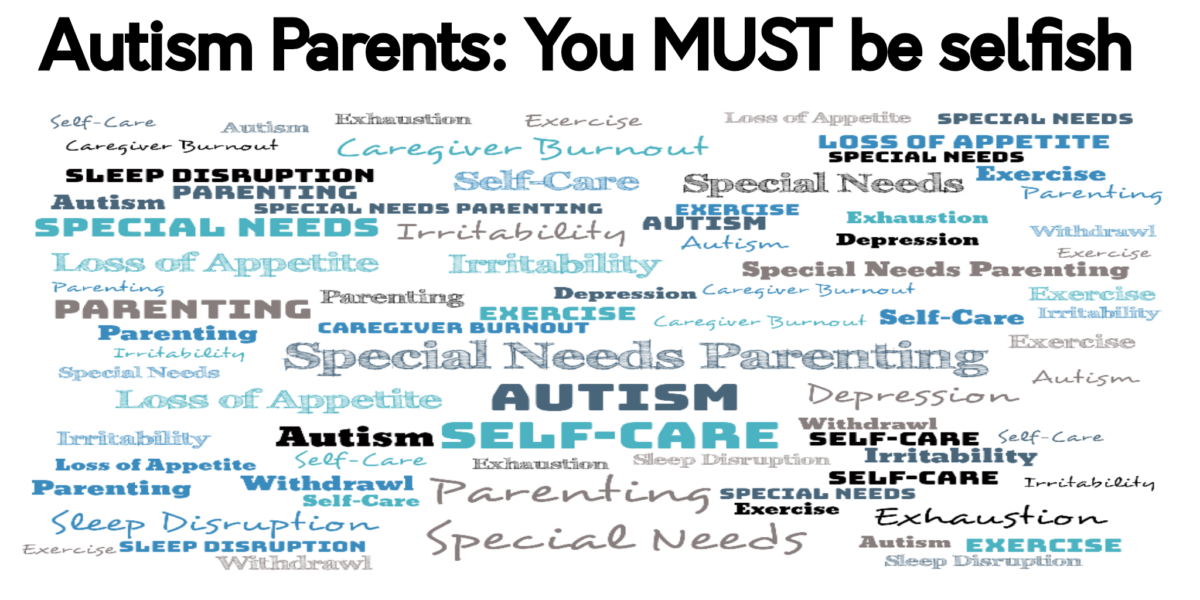I’ve been an Autism parent for almost seventeen years. In other words, I’ve done this a very, very long time. Along the way, I’ve learned countless lessons. Unfortunately, many of those lessons were learned the hard way.
One of the most important things I’ve learned is that I have to take care of myself.
When you’re a parent to a child or in my case, children – with special needs, it’s incredibly easy to get tunnel vision. We feel like we have to put every ounce of all we have into our kids. While this is well-intentioned, it’s also largely misguided.

The amount of stress and lack of sleep the average Autism or Special Needs parent deals with is staggering. The worst part about this is that we become so used to living this way, we don’t even realize it’s happening. The impact on our bodies and minds can be significant. This lifestyle is largely unsustainable because we all have our limits.
No matter how much we love our kids, we are still human and are subject to those limitations.
Here’s the scariest but most important question, that as an autism parent, you need to be asking yourself. What happens to my child if something happens to me? I know that’s a chilling notion but the reality is, many of us are living in this exact situation. The truth is, we don’t live forever and our Autism or Special Needs kids will most likely outlive us. There’s nothing we can do to avoid that.
Another major problem that being a little selfish can help to avoid is Caregiver or Caretaker Burnout.
According to WebMD:
What Are the Symptoms of Caregiver Burnout?
The symptoms of caregiver burnout are similar to the symptoms of stress and depression. They may include:
- Withdrawal from friends and family
- Loss of interest in activities previously enjoyed
- Feeling blue, irritable, hopeless, and helpless
- Changes in appetite, weight, or both
- Changes in sleep patterns
- Getting sick more often
- Feelings of wanting to hurt yourself or the person for whom you are caring
- Emotional and physical exhaustion
- Excessive use of alcohol and/or sleep medications
- Irritability
What Causes Caregiver Burnout?
Caregivers often are so busy caring for others that they tend to neglect their own emotional, physical, and spiritual health. The demands on a caregiver’s body, mind, and emotions can easily seem overwhelming, leading to fatigue and hopelessness — and, ultimately, burnout. Other factors that can lead to caregiver burnout include:
- Role confusion — Many people are confused when thrust into the role of caregiver. It can be difficult for a person to separate her role as caregiver from her role as spouse, lover, child, friend, etc.
- Unrealistic expectations — Many caregivers expect their involvement to have a positive effect on the health and happiness of the patient. This may be unrealistic for patients suffering from a progressive disease, such as Parkinson’s or Alzheimer’s.
- Lack of control — Many caregivers become frustrated by a lack of money, resources, and skills to effectively plan, manage, and organize their loved one’s care.
- Unreasonable demands — Some caregivers place unreasonable burdens upon themselves, in part because they see providing care as their exclusive responsibility.
- Other factors — Many caregivers cannot recognize when they are suffering burnout and eventually get to the point where they cannot function effectively. They may even become sick themselves.
How Can Autism Parents Prevent Caregiver Burnout?
Here are some steps you can take to help prevent caregiver burnout:
- Find someone you trust — such as a friend, co-worker, or neighbor — to talk to about your feelings and frustrations.
- Set realistic goals, accept that you may need help with caregiving, and turn to others for help with some tasks.
- Be realistic about your loved one’s disease, especially if it is a progressive disease such as Parkinson’s or Alzheimer’s.
- Don’t forget about yourself because you’re too busy caring for someone else. Set aside time for yourself, even if it’s just an hour or two. Remember, taking care of yourself is not a luxury; it is an absolute necessity if you’re going to be an effective caregiver.
- Talk to a professional. Most therapists, social workers, and clergy members are trained to counsel individuals dealing with a wide range of physical and emotional issues.
- Take advantage of respite care services. Respite care provides a temporary break for caregivers. This can range from a few hours of in-home care to a short stay in a nursing home or assisted living facility.
- Know your limits and do a reality check of your personal situation. Recognize and accept your potential for caregiver burnout.
- Educate yourself. The more you know about the illness, the more effective you will be in caring for the person with the illness.
- Develop new tools for coping. Remember to lighten up and accentuate the positive. Use humor to help deal with everyday stresses.
- Stay healthy by eating right and getting plenty of exercise and sleep.
- Accept your feelings. Having negative feelings — such as frustration or anger — about your responsibilities or the person for whom you are caring is normal. It does not mean you are a bad person or a bad caregiver.
Where Can I Turn for Help With Caregiver Burnout?
If you are already suffering from stress and depression, seek medical attention. Stress and depression are treatable disorders. If you want to help prevent burnout, consider turning to the following resources for help with your caregiving:
- Home health services — These agencies provide home health aids and nurses for short-term care if your loved one is acutely ill. Some agencies provide short-term respite care.
- Adult daycare– These programs offer a place for seniors to socialize, engage in a variety of activities, and receive needed medical care and other services.
- Nursing homes or assisted living facilities — These institutions sometimes offer short-term respite stays to provide caregivers a break from their caregiving responsibilities.
- Private care aides — These are professionals who specialize in assessing current needs and coordinating care and services.
- Caregiver support services — These include support groups and other programs that can help caregivers recharge their batteries, meet others coping with similar issues, find more information, and locate additional resources.
- Area Agency on Aging — Contact your local Area Agency on Aging or your local chapter of the AARP for services available in your areas such as adult day care services, caregiver support groups, and respite care.
- National organizations — Look in a phone directory or search online for local agencies (such as Family Caregiver Alliance), chapters of national organizations dedicated to assisting people with illnesses such as Parkinson’s disease or stroke. These groups can provide resources and information about respite care and support groups.
WebMD Medical Reference Reviewed by Melinda Ratini, DO, MS on May 10, 2017
We Don’t Live Forever
While we won’t live forever, we can do things now to help us live the longest, healthiest life possible. In order to do this, we have to be selfish. Being selfish isn’t always a bad thing, especially when doing so helps to ensure a better future for our special kids.
Being selfish means that we sometimes have to put ourselves first. I know that goes against every fiber of our being but it’s absolutely crucial. How we each put ourselves first may vary because we all have different needs and have different resources available to us. Some of us have family or friends who give us the occasional break and some of us don’t have that.
What’s important is that you find a way to take care of yourself. Maybe that’s taking a few minutes each day for a cup of coffee or a spot of tea. Maybe it’s talking on the phone to a friend or family member. Perhaps it’s taking advantage of a break you’ve been given to get some desperately needed sleep. It could literally be anything that helps you to decompress, de-stress, or get some rest. It’s also important to get exercise whenever possible and there are a million creative ways in which you can do that.
The point of this article isn’t to give you specific instructions to address this problem because everyone’s different. My hope is that this article will encourage you to practice self-care. How you do that is up to you. The most important thing is that you recognize that you have limits, and figure out little ways to help you decompress or recharge.
Even the smallest things can make a difference over time. We all want to give our kids the best, why not start with giving them the best of ourselves.



So how do you coup when you are an autism mother, recovering from breast cancer and caring for a spouse (not the father of the autistic adult- she’s 19) who has advanced Parkinson’s in the middle of a pandemic? I’m so tired! Ready to throw in the towel.
Marie,
I see you. I can’t imagine what you’re going through and I’m so sorry for your struggle. I wanted to talk with you but I wasn’t sure you wanted to have a public conversation. If I can help in any way, even if you just need to talk, please shoot me an email and do anything I can to help. You can vent if you need to. I understand trying to navigate this life with medical complexities because I do that everyday, but I’m not in your shoes and I I won’t pretend to know how you’re feeling. Please message me if you need to talk.
As a professional carer of adults who have autism I would say that you have to be selfish to give your children a quality of life in adulthood. Too many times I have seen people locked in secure facilities or unable to go out in public because they have not been taught the basic rules of society. You are doing them no favours by not saying ” no” because they don’t like it. Yes, they may have a meltdown but imagine your child as a grown adult having that same meltdown, consequences are much more serious
Excellent information. We have 4 boys, one of whom is HFA. I’m researching a non-for profit group… https://t.co/Cg4gz6SSrE